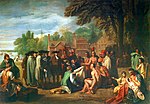User:SammiQ/sandbox
| Cherokee Nation v. Georgia | |
|---|---|
 | |
| Decided March 18, 1831 | |
| Full case name | The Cherokee Nation v. The State of Georgia |
| Citations | 30 U.S. 1 (more) 8 L. Ed. 25; 1831 U.S. LEXIS 337 |
| Holding | |
| The Supreme Court does not have original jurisdiction to hear a suit brought by the Cherokee Nation, which is not a "foreign State" within the meaning of Article III | |
| Court membership | |
| |
| Case opinions | |
| Majority | Marshall, joined by McLean |
| Concurrence | Johnson |
| Concurrence | Baldwin |
| Dissent | Thompson (joined by Story) |
| Laws applied | |
| U.S. Const. art. III | |
Cherokee Nation v. Georgia, 30 U.S. 1 (1831), was a United States Supreme Court case. The Cherokee Nation sought a federal injunction against laws passed by the state of Georgia depriving them of rights within its boundaries, but the Supreme Court did not hear the case on its merits. It ruled that it had no original jurisdiction in the matter, as the Cherokee were a dependent nation, with a relationship to the United States like that of a ward to its guardian.
Background[edit]
On December 20, 1828, the state legislature of Georgia, fearful that the United States would not enforce (as a matter of Federal policy) the removal of the Cherokee people from their historic lands in the state, enacted a series of laws which stripped the Cherokee of their rights under the laws of the state. They intended to force the Cherokee to leave the state. In this climate, John Ross, Principal Chief of the Cherokee Nation, led a delegation to Washington in January 1829 to resolve disputes over the failure of the US government to pay annuities to the Cherokee, and to seek Federal enforcement of the boundary between the territory of the state of Georgia and the Cherokee Nation's historic tribal lands within that state. Rather than lead the delegation into futile negotiations with President Jackson, Ross wrote an immediate memorial to Congress, completely forgoing the customary correspondence and petitions to the President.
Ross found support in Congress from individuals in the National Republican Party, such as senators Henry Clay, Theodore Frelinghuysen, and Daniel Webster, as well as representatives Ambrose Spencer and David (Davy) Crockett. Despite this support, in April 1829, John H. Eaton, the secretary of war (1829–1831), informed Ross that President Jackson would support the right of Georgia to extend its laws over the Cherokee Nation. In May 1830, Congress endorsed Jackson's policy of removal by passing the Indian Removal Act, which authorized the president to set aside lands west of the Mississippi River to exchange for the lands of Indian nations in the east. The removal of the Indians was to occur by any means necessary. While some tribes willingly left their lands, others decided to fight the Americans, some with physical violence, others with a more legal approach. [1]
When Ross and the Cherokee delegation failed to protect Cherokee lands through negotiation with the executive branch and through petitions to Congress, Ross challenged the actions of the federal government through the U.S. courts.
The case[edit]
In June 1830, a delegation of Cherokee led by Chief John Ross, selected (at the urging of Senators Daniel Webster and Theodore Frelinghuysen), William Wirt, attorney general in the Monroe and Adams administrations, to defend Cherokee rights before the U.S. Supreme Court. The Cherokee Nation asked for an injunction, claiming that Georgia's state legislation had created laws that "go directly to annihilate the Cherokees as a political society." Wirt argued that "the Cherokee Nation [was] a foreign nation in the sense of our constitution and law" and was not subject to Georgia's jurisdiction. Wirt asked the Supreme Court to void all Georgia laws extended over Cherokee lands on the grounds that they violated the U.S. Constitution, United States-Cherokee treaties, and United States intercourse laws.
The Court did hear the case but declined to rule on the merits. The Court determined that the framers of the Constitution did not really consider the Indian Tribes as foreign nations but more as "domestic dependent nation[s]" and consequently the Cherokee Nation lacked the standing to sue as a "foreign" nation. Chief Justice Marshall said; "The court has bestowed its best attention on this question, and, after mature deliberation, the majority is of the opinion that an Indian tribe or nation within the United States is not a foreign state in the sense of the constitution, and cannot maintain an action in the courts of the United States. " [CHEROKEE NATION v. STATE OF GA., 30 U.S. 1 (1831)] The Court held open the possibility that it yet might rule in favor of the Cherokee "in a proper case with proper parties".
Chief Justice John Marshall wrote that "the relationship of the tribes to the United States resembles that of a ‘ward to its guardian'."[2]
See also[edit]
Notes[edit]
- ^ West, Elliot. "The Indian Removal Act".
- ^ Wilkinson, C. (1988). American Indians, Time, and the Law: Native Societies in a Modern Constitutional Democracy, Yale University Press
References[edit]
- Anton-Herman Chroust, "Did President Andrew Jackson Actually Threaten the Supreme Court of the United States with Non-enforcement of Its Injunction Against the State of Georgia?," 4 Am. J. Legal Hist. 77 (1960).
- Kenneth W. Treacy, "Another View on Wirt in Cherokee Nation", 5 Am. J. Legal Hist. 385 (1961).
External links[edit]
 Works related to Cherokee Nation v. Georgia at Wikisource
Works related to Cherokee Nation v. Georgia at Wikisource- Text of Cherokee Nation v. Georgia, 30 U.S. 1 (1831) is available from: Findlaw Justia


